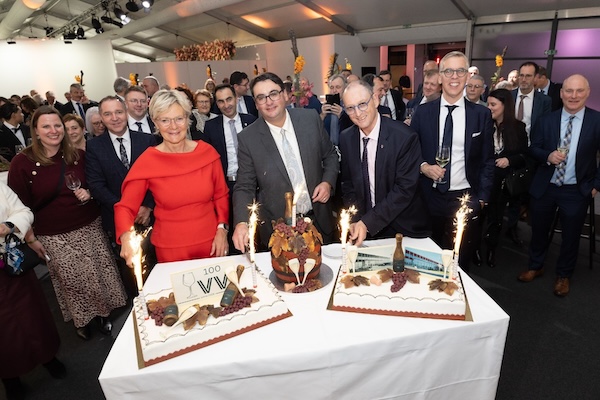 (L-R) Martine Hansen, Luxembourg Minister of Agriculture, Food and Viticulture; Serge Fischer, Head of Luxembourg's Remich-based Wine Institute; Jacques Sitz, Mayor of Remich; Léon Gloden, Luxembourg's Minister for Home Affairs;
Credit: SIP / Claude Piscitelli
(L-R) Martine Hansen, Luxembourg Minister of Agriculture, Food and Viticulture; Serge Fischer, Head of Luxembourg's Remich-based Wine Institute; Jacques Sitz, Mayor of Remich; Léon Gloden, Luxembourg's Minister for Home Affairs;
Credit: SIP / Claude Piscitelli
On Thursday 27 November 2025, the Wine Institute (Institut Viti-Vinicole - IVV) celebrated its centenary during an official academic ceremony held in the large tent on the Glacis in Luxembourg City.
According to Luxembourg’s Ministry of Agriculture, Food and Viticulture, the solemn and emotional event brought together numerous leading personalities, as well as a wide audience of staff members, former staff, partners and key actors from Luxembourg’s wine sector.
Among the guests of honour were the Grand Duke, President of the Chamber of Deputies Claude Wiseler and Prime Minister Luc Frieden, as well as several members of the government: Martine Hansen, Minister of Agriculture, Food and Viticulture; Léon Gloden, Minister for Home Affairs; Georges Mischo, Minister of Labour; and Stéphanie Obertin, Minister for Research and Higher Education. The presence of the Wine Queen and the Riesling Queen, Moselle winegrowers, mayors of Moselle municipalities and numerous institutional partners further highlighted the significance of this celebration for the entire sector.
The academic ceremony was opened by Serge Fischer, Director of the Wine Institute, who warmly welcomed the guests.
According to the ministry, the Wine Institute, founded one hundred years ago, has over the decades become “an essential reference” in the fields of viticulture and oenology in Luxembourg. Established with the aim of improving the quality of wine production and structuring the sector, the institute has evolved in parallel with agricultural, economic and climatic developments.
Since its creation, the Wine Institute has played a key role in the modernisation of viticultural practices, the introduction of new cultivation techniques, applied research, quality control and advisory services for winegrowers. According to the ministry, it has made “a decisive contribution” to the growing reputation of Luxembourg’s Moselle wines and crémants at both national and international levels.
Over the years, the institute has expanded its expertise to cover a wide range of areas, including viticultural research and experimentation, oenological analyses and quality control, personalised technical advice for wine estates, support in sustainability and environmentally respectful agriculture, as well as training and knowledge transfer. As a component of the Ministry of Agriculture, Food and Viticulture, the Wine Institute acts as a key partner for Moselle winegrowers, contributing to the promotion of the region’s terroir and supporting a viticulture that is described as “high-performing, sustainable and forward-looking”.
The academic session on 27 November 2025 offered a moment of reflection, featuring official speeches, presentations retracing major milestones in the institute’s history and testimonials highlighting its impact on several generations of wine professionals. Speakers acknowledged the work carried out by successive teams and the institute’s long-standing commitment to the wine sector. Several interventions recalled the challenges encountered over the decades, including technological developments, economic crises and the need to adapt to contemporary issues.
The ministry added that the event was also an opportunity to express gratitude to current and former staff, whose expertise and dedication have shaped the institute’s reputation and “excellence”.
While the centenary served as an occasion to honour the institute’s heritage, it also opened discussions on future challenges. Innovation, sustainability, adaptation to climate change and continued quality improvement will remain central to the mission of the Wine Institute, in line with its role as a supporter and driving force for Luxembourg’s viticulture. By marking its 100th anniversary, the institute reaffirmed its central role in the development of a modern, resilient and firmly rooted Luxembourgish wine tradition.









